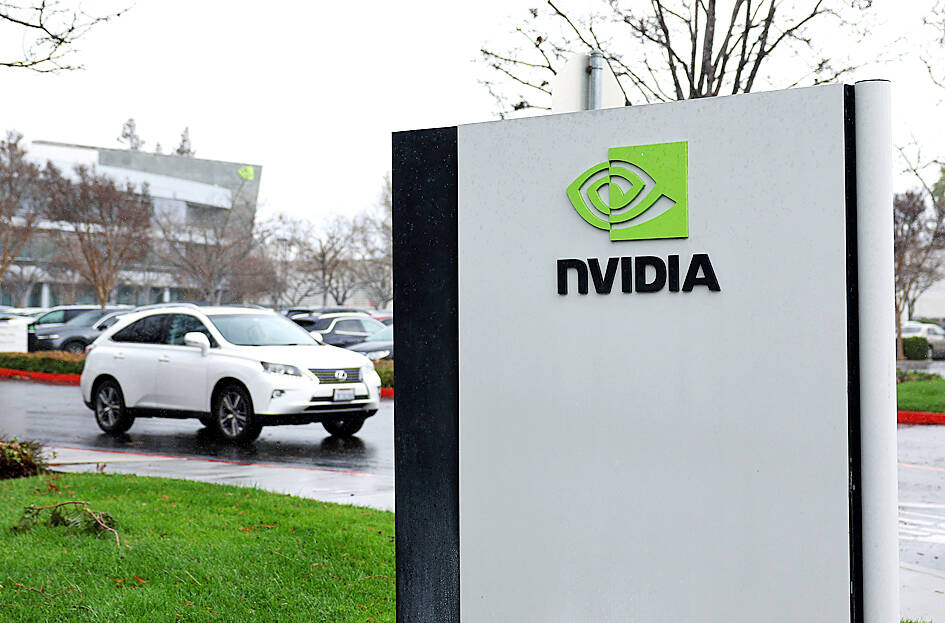Nvidia Corp and Cisco Systems Inc are teaming up to make it easier for corporations to build their own AI computing infrastructure, an attempt to push the technology beyond the big data-center providers.
Under an arrangement announced yesterday, Cisco is to offer Nvidia-based equipment — popular for developing artificial intelligence models — along with its networking gear.
For Nvidia, the partnership opens up another channel for its technology. Cisco, meanwhile, gets to capitalize on an AI spending boom that has helped turn Nvidia into the world’s most valuable chipmaker.

Photo: AFP
“Working closely with Cisco, we’re making it easier than ever for enterprises to obtain the infrastructure they need to benefit from AI, the most powerful technology force of our lifetime,” Nvidia chief executive officer Jensen Huang (黃仁勳) said in a statement.
Cisco is to offer M7 server computers that use Nvidia’s latest processors, as well as the chipmaker’s software, AI models and development tools. It is also offering its own cloud-based software and services for monitoring and managing such systems.
“Strengthening our great partnership with Nvidia is going to arm enterprises with the technology and the expertise they need to build, deploy, manage and secure AI solutions at scale,” Cisco CEO Chuck Robbins said.
The two companies made the announcement at the Cisco Live event in Amsterdam early yesterday. It is part of an effort to spread the deployment of AI hardware beyond its current concentration in data centers owned by Microsoft Corp, Amazon.com Inc, Alphabet Inc’s Google and Meta Platforms Inc.
That group of so-called hyperscalers represents a potentially risky concentration of revenue for Nvidia. Though demand for the company’s chips remains insatiable, those customers could ultimately use more of their own technology. They are all either working on their own chips or have already begun adopting them in some way.
Cisco’s largest sales team is to sell Nvidia-based servers combined with its Ethernet networking gear. Nvidia offers an alternative called InfiniBand in its own products. The closer tie-up with Cisco gives Nvidia better access to customers who prefer to stick with the more widely used standard for transferring data between computers.

To many, Tatu City on the outskirts of Nairobi looks like a success. The first city entirely built by a private company to be operational in east Africa, with about 25,000 people living and working there, it accounts for about two-thirds of all foreign investment in Kenya. Its low-tax status has attracted more than 100 businesses including Heineken, coffee brand Dormans, and the biggest call-center and cold-chain transport firms in the region. However, to some local politicians, Tatu City has looked more like a target for extortion. A parade of governors have demanded land worth millions of dollars in exchange

An Indonesian animated movie is smashing regional box office records and could be set for wider success as it prepares to open beyond the Southeast Asian archipelago’s silver screens. Jumbo — a film based on the adventures of main character, Don, a large orphaned Indonesian boy facing bullying at school — last month became the highest-grossing Southeast Asian animated film, raking in more than US$8 million. Released at the end of March to coincide with the Eid holidays after the Islamic fasting month of Ramadan, the movie has hit 8 million ticket sales, the third-highest in Indonesian cinema history, Film

Taiwan Semiconductor Manufacturing Co’s (TSMC, 台積電) revenue jumped 48 percent last month, underscoring how electronics firms scrambled to acquire essential components before global tariffs took effect. The main chipmaker for Apple Inc and Nvidia Corp reported monthly sales of NT$349.6 billion (US$11.6 billion). That compares with the average analysts’ estimate for a 38 percent rise in second-quarter revenue. US President Donald Trump’s trade war is prompting economists to retool GDP forecasts worldwide, casting doubt over the outlook for everything from iPhone demand to computing and datacenter construction. However, TSMC — a barometer for global tech spending given its central role in the

Alchip Technologies Ltd (世芯), an application-specific integrated circuit (ASIC) designer specializing in server chips, expects revenue to decline this year due to sagging demand for 5-nanometer artificial intelligence (AI) chips from a North America-based major customer, a company executive said yesterday. That would be the first contraction in revenue for Alchip as it has been enjoying strong revenue growth over the past few years, benefiting from cloud-service providers’ moves to reduce dependence on Nvidia Corp’s expensive AI chips by building their own AI accelerator by outsourcing chip design. The 5-nanometer chip was supposed to be a new growth engine as the lifecycle